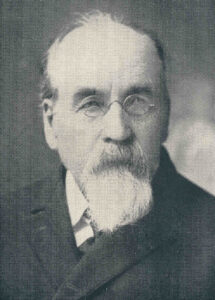Reminiscences
of
Pastor Ole Paulson;
1907 Autobiography.
Chapter Four

A translation from the Norwegian language into the English language.
Copyright © 2022 by Gary C. Dahle, all rights reserved.
At the Sawmills
We lived in Muskego for about two years, at the home of Mrs. Berthe Skofstad, a good half mile[1] from the church. As long as we were able to work, we were spread around to various places. I, for my part, was in Manistee, Michigan, for two years, where I worked in the sawmills. The first winter I was there, I worked together with a German newcomer, a boy a bit older than me. We two worked together with a “team” around the sawmill. Newcomers that we both were, we couldn’t understand each other without the help of gestures and facial expressions. My companion spoke his German tongue when he addressed me. I answered in Norwegian. “Kann nicht verstehen,”[2] he said, meaning “Cannot understand.” I heard this phrase so often that at last, I thought it was Norwegian: Kan ikke forstaa, cannot understand. When he started out with a long string of words in German, which I did not understand, I said: “Kann nicht verstehen.” He shook his head and said, “Ach! Du bist dumm,” Ach! You are dumb. “Er jeg dum?” Am I dumb?, I said in Norwegian. “Ja, du bist dumm,” he answered, Yes, you are dumb. Now I had learned a new sentence, for these words were nearly Norwegian.
One morning when he wasn’t feeling well, he came to me and said: “Heute kann ich nicht arbeiten,” Today I cannot work. “Kan du ikke arbeide?” I asked, Can you not work? “Nein,” he answered, “Ich bin krank.” Jeg er krank,[3] I am sick. This was also nearly the same as Norwegian. Now I had acquired two more new sentences.
When it was going toward midday one day, he said: “Ich bin hungrig, lasset uns heimgehen.” Jeg er hungrig, lader os gaa hjem, I am hungry, let us go home. This was also something simple to grasp for a newcomer Norwegian. One day I came to him and made gestures that I wanted something: “Was wilst du?” he asked, What do you want? “Ich bin hungrig, lasset uns heimgehen,” I said in pure German. “Das ist gut! Komm, wir gehn.” Det er godt, komm, vi gaar, That’s good, come on, we’re going.
In this way, we managed through the whole winter. In the spring, I could speak both English and German, so that I could manage for myself in both of these useful languages. The German had learned neither English nor Norwegian. Now I had reason to say to him: “Ach, du bist doch dumm,” Ach, you are still dumb.
In the spring of 1851, I went across the lake to Milwaukee to receive my hard-earned money. The company I worked for had its headquarters in Milwaukee. Having arrived in Milwaukee, I took lodging with a Norwegian, Gabrielsen, who was a carpenter by trade. He had a carpentry workshop, and a German who worked with him there. Gabrielsen kept a little lodging house. In the morning, I came into the workshop and heard Gabrielsen and the German speaking German with each other. I joined in on the conversation with them in this language. During the chat, I swore in German. Back then, I didn’t know any better, because the people in my home village were horrible to swear. The Solungs were known for their vulgar carnal oaths. Gabrielsen was an old Haugean. It was the last time an oath passed over my lips. I ended up with that gruff man on top of me like a tornado for my coarse offense. He took hold of me with quite a notable eloquence. I went silent and felt humiliated, like a beaten dog. The treatment did me some good, in that I have never since given offense with swearing.
After a couple of days’ stay in Milwaukee, I went by steamboat to Racine, where I was a little bit acquainted from the previous autumn. I had namely worked in Michigan for a company that had its main office in Racine. Back then, one had to cross the lake to get the money one had worked for at the sawmills in Michigan. You could count yourself lucky if you got all that was owed to you in cash. People wanted to palm their wares off on you in place of what you had come to collect from them. The company in Racine was known for its miserliness toward its workers in this regard. It wasn’t much that I had come to claim, but I had to accept wares and pay an arm and a leg for them.
Already by then there were not a few Norwegians in Racine. If I remember correctly, there was already a bit of mission work in Racine. There was, however, no Lutheran church yet. The Methodists, by contrast, were carrying on a tremendous effort.
From here, I went on foot one afternoon to Yorkville Prairie, where I had a very few acqaintances. Here, the Norwegians, or more accurately Elling Eielsen, had put up a little religious meeting house with money that he was supposed to have collected in Norway. In this small, insignificant-looking house of God, both Pastor Hans Andreas Stub and Eielsen preached. I attended Stub’s worship service here one Sunday. Eielsen had his farm not so far from this place. He had not so long ago gotten married to a wealthy man’s daughter from the area, about which there was a lot of talk in Muskego. Mrs. Eielsen was a godfearing maid, which is why she had chosen a man after her own heart. Mrs. Eielsen was a woman who did not greatly heed what Paul says about women: “Silence your women in the congregations! For they are not allowed to speak.” 1 Corinthians 14:34.
Mrs. Eielsen spoke with great forcefulness in gatherings of the congregation. One could say she was a better preacher than Eielsen himself.
Mrs. Eielsen was a daughter of Hermand Nielsen of North Cape.
After some days’ visiting at Yorkville, I came back to Muskego and stayed there with my folks for a couple of months. While I was there, I was always at the services at church and the edifications[4] at the schoolhouse. Ole J. Hatlestad held an edification one Sunday afternoon in the schoolhouse. It was while he was still a layman and occupied himself with giving out a newspaper in Racine. One evening, Father and I came by happenstance to a neighbor of Skofstad while there was a prayer meeting being held there. There were a dozen people present. I had never seen such a meeting before. I was amazed that these old bearded men could be so learned that they could stand up, one after another, and offer such beautiful prayers. I was neither offended nor shocked. It didn’t occur to me that it was un-Christian or un-Lutheran. If only I had been able to say a prayer from memory, I would have stood and said it. So little understanding had I about the prayers that these bearded old men spoke that I believed they had memorized them.
[1] Paulson might mean half a U.S. mile here. Otherwise, if he means a Norwegian mile, “half” would be five kilometers or 3.1 U.S. miles.
[2] Paulson gives the German boy’s words in German and doesn’t translate them into Norwegian for his audience of Norwegian readers. He could safely assume that his readers would be able to understand the German, either because some words look and sound similar to Norwegian or because context would help them understand. In this way, he creates for his readers an experience similar to the one he had when he worked with the German immigrant at the sawmill. To help readers of this translation, I have translated both the Norwegian and the German.
[3] Krank is an old-fashioned way to say “sick” or “poorly” in Norwegian, but it is no longer commonly used for that meaning.
[4] The Norwegian word used here is oppbyggelse, meaning, literally, an “up-building.” It refers to a gathering where people would build up and strengthen one another in their faith, and it has its biblical roots in verses such as Thessalonians 5:11: “Therefore encourage one another and build up each other, as indeed you are doing.” Because it isn’t common or natural-sounding in English to refer to a gathering as an “up-building,” the word “edification” is used here instead. To edify is “to improve, especially in moral and religious knowledge.” The word has the same Latin roots as oppbyggelse and in older usage, it also meant “to build.”
Translation of chapter from the Norwegian language into the English language, and preparation of footnotes, by Denise Logeland.
